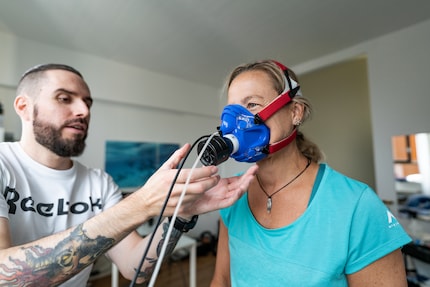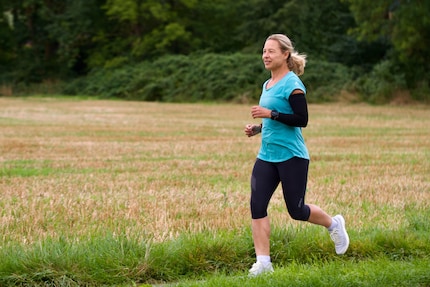
Background information
Five weeks until my half marathon – optimising my diet
by Siri Schubert

Looking for information about nutrition on social media can quickly descend into a labyrinth of advice and restrictions. To shed some light on the subject, I spoke to Gregory Grünig, nutritional diagnostician at the Erpse Institute.
As an athlete, I obviously want to focus on good, healthy nutrition. But what actually is good nutrition for active people? Some sources recommend intermittent fasting, others say I should eat four times a day. Some say no carbohydrates, others recommend sugary sports gels. Thoroughly confused, I seek professional help from Gregory Grünig.
Gregory Grünig (website in German) is a fitness trainer and nutritional diagnostician at the Erpse Institute (website in German), which I chose because the institute deals specifically with nutrition for athletes. The nutritional diagnostics offered by the Erpse Institute analyse exercise, sport and psychological factors to recommend a diet tailored to an individual’s needs. After a detailed examination and consultation, I still had a few questions for the nutrition expert.
This is a rundown of my experience with the tests and advice.
Food and sport are often linked. Some exercise to lose weight, others pay attention to what they eat to improve their performance. Are there any things you can recommend to athletes in general?
Gregory Grünig: If there’s one thing that’s universally valid, it’s the «emperor, king, beggar» proverb, i.e. eat breakfast like an emperor, eat lunch like a king and eat dinner like a beggar. But that’s where it ends. Everything else depends on individual physiology and psychology. For example, whether the person in question is currently under a lot of stress. Or whether they want to train today or did a hard workout yesterday.
Intermittent fasting is now a trend that I come across almost every day on social media. One variant recommends not eating anything in the first half of the day. What’s your take on that?
I don’t believe in it. I’m sure I see someone in my practice almost every week who fasts at intervals either consciously or unconsciously. During VO2 testing, where we measure oxygen uptake as an indicator of heart, lung and circulatory system function, bottlenecks quickly become apparent. Intermittent fasting may improve oxygen absorption and decrease inflammatory processes in the resting phase. But as soon as the person experiences a higher intensity due to stress in everyday life or through sport, their performance deteriorates massively and they develop subsequent problems such as sleep disorders, gastrointestinal complaints and skin sensitivity. That’s why I almost always consider «emperor, king, beggar» to be the better approach.

What does the body struggle with during intermittent fasting?
When we get up in the morning, our liver’s glucose storage is mostly empty. At the same time, cortisol, a stress hormone, increases so that we wake up. If our cortisol levels remain elevated, it has a negative impact on our body. A carbohydrate-based breakfast stabilises blood sugar and lowers cortisol levels. Another problem with intermittent fasting is that if you eat more in the second half of the day, more body fat is usually stored in the centre of the body, i.e. on the trunk and stomach. There are studies that now clearly show that intermittent fasting is more likely to lead to an increase in body fat because the most calories are consumed in the second half of the day. But we don’t need as much energy in the evening and at night because we aren’t as active.
So what’s the equation: fewer calories and more exercise equals weight loss?
Nutrition is much more complex than this simple equation. Many people who come to us for advice eat too few calories for their metabolism, but instead of losing weight, they may even gain weight, possibly because they’re under too much stress and are overworked. I think it’s nonsense to recommend a blanket calorie deficit.
Are there situations in which someone needs to eat more to lose weight?
Absolutely. It depends on where you want to lose weight. If someone wants to lose weight on their arms and legs, it can be helpful to consume more calories because in such cases it’s often about muscle regeneration and muscles recover better when they have enough nutrients. Even if someone isn’t eating enough, putting the body under stress, we sometimes recommend eating more.
What factors make it difficult to lose weight?
Stress is definitely the main one. Stress can reduce insulin sensitivity. This means that muscle cells can’t absorb carbohydrates properly, so they’re stored in the form of fat. As a result, they’re not available where they’re needed. Protein from the blood and possibly also the muscles is then used as a substitute for energy production. During training, especially intense training, we shouldn’t get into a state of depletion. In addition, the breakdown of protein again leads to an increased release of stress hormones. So, it’s a downward spiral. In addition, water is stored outside the cells, resulting in weight gain. If athletes don’t recover sufficiently between training sessions – maybe because they haven’t slept well or are experiencing stress in their everyday lives – they can suffer with water retention, weight gain and the sensation of having heavy legs.
How do I know if I’m overstressed?
Many people don’t actually realise when they’re under too much stress. Athletes can get caught up in a cycle of overexertion and a lack of recovery without feeling like they’re doing much wrong. If the statistics show that their recovery and therefore their adaptation to the training is sub-optimal, many say that they’re not stressed. But you have to make a distinction: maybe the person in question is sleeping badly or is experiencing a stressful situation in everyday life or at work. However, it can also be the case that their cardiovascular system or muscles are under too much strain as a result of sport. Or it could be that the body is under stress due to the person not eating enough during the day – there’s that intermittent fasting again. People who use exercise to alleviate their stress and then end up putting too much strain on their bodies can get caught up in this cycle. Many people don’t feel that they’re in a stressful situation because they don’t notice it or think they have to meet all external demands. If I tell an ambitious athlete that they’re training too much, they often reply that it’s not possible to train too much. But it is. You can do too much of anything.
So good nutrition is just one factor in the interaction between body and mind?
Psychological factors are very significant. Experiences from childhood and adolescence influence basic traits such as the need for security and control. These needs affect our energy balance in everyday life. Mindset plays a big role in how much energy we spend when and in which situations. Because it’s not only the muscles that need a lot of nutrients, especially glucose; the brain does too. If there are imbalances between energy-giving and energy-consuming needs, then this can also lead to weight gain. There are people who actually do everything right when it comes to their diet and still have problems because the overload is the result of their mindset. This is practically impossible to solve with nutritional tips if you don’t know where to apply leverage. It’s like driving your car to the butcher and asking him to fix the car. They can’t. The basic idea is therefore to find out the causes of the problem and then draw the right conclusions from them. Especially in sport, a lot of attention is paid to physiological factors. But we also need to take psychological factors into account if we really want to achieve positive change.
What does that mean specifically?
Athletes have to be able to set boundaries when they’re overloaded. This means either cutting back at work or in everyday life or reducing their exercise to rebalance their energy levels. Unfortunately, many of them still feel like they have to function, no matter how broken they are. This can work well for a while, but most of the time there’s a breaking point in the body. This can be the intestines, the skin or the lungs. That sounds complex, but the consultation quickly reveals where the problem is. The question then is whether you can or want to change it at that time.
There are more and more food intolerances nowadays. How does that fit into the picture?
Each organ has its own metabolism, and a suboptimal overall oxygen supply can lead to a bottleneck in your digestive system. If the intestine doesn’t receive enough oxygen, anaerobic processes with lactate and acid formation increase. If the intestines then come under more stress from food, intolerances or other digestive problems can occur. Ideally, we then start with nutrition and training. Training enables us to optimise the metabolism so that we absorb more oxygen. Through the right nutrition and the right timing, we can influence training so that it delivers real improvements. It’s down to an interplay of nutrition, mindset, training and recovery. All four are important if we want to optimise metabolism and make improvements.
There’s currently a tendency to demonise certain types of food, such as sugar. What’s your take on that?
The great thing is that there’s actually a place for everything in your diet. Of course, it’s all about moderation. The world won’t end if we eat ice cream in the summer or chocolate every now and then. Sugar’s also useful in sports nutrition. The body burns sugar under stress, so we should consume sugar because this is the fastest available type of energy and doesn’t unnecessarily burden the gastrointestinal system. Before, during and maybe even after exercise you can consume sugar, for example in the form of a gel or sweetened electrolyte drink, but otherwise sugar shouldn’t be on the menu.

Let’s talk about signs of deficiency. Magnesium tablets, vitamin D drops and other nutritional supplements are being recommended by friends or on social media all of a sudden. Are they needed?
There’s little point in simply taking vitamin D or a multivitamin because you assume it’s healthy. Blood tests are also often difficult to interpret. Blood composition is subject to daily fluctuations, and a magnesium deficiency can level out the next day. If there are symptoms of deficiency, you have to get to the bottom of it. But just taking nutritional supplements on an assumption isn’t a good idea. It’s much better to focus on a nutrient-rich diet with fresh ingredients and, if necessary, taking a supplement that’s appropriate and useful in your specific circumstances.
So you always start from the individual and the data that you measure for that specific person. Is there still something that almost everyone does wrong?
I’d say that most athletes completely underestimate how many calories they need. Sports watches also play a role here, as they often indicate too low a calorie requirement. This can actually trigger an eating disorder. When we exercise, we’re physiologically in hunting mode and that equals stress. Without enough food, we can’t make the progress we actually want to achieve. There’s often a craving for sweets and increased hunger in the second half of the day. The other common mistake is that we train too much. We want to perform better, so we do more. But that’s often a mistake. Sometimes we need to recover better and sometimes we just need to eat more.
Thanks, Gregory.
Header image: Oliver Fischer
Research diver, outdoor guide and SUP instructor – I love being in, on and around water. Lakes, rivers and the ocean are my playgrounds. For a change of perspective, I look at the world from above while trail running or flying drones.
Interesting facts about products, behind-the-scenes looks at manufacturers and deep-dives on interesting people.
Show all